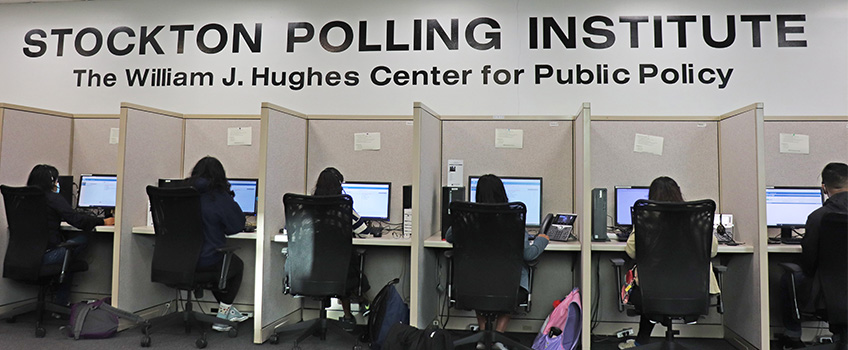Stockton Poll: Mazzeo Leads in 2nd District Senate Race

Galloway, N.J. - Democrat Vince Mazzeo leads Republican Vince Polistina in the competitive State Senate race in New Jersey’s 2nd Legislative District, but the State Assembly candidates are essentially tied, according to a Stockton University poll released today.
Mazzeo leads with 48% to 41% for Polistina with 6% undecided when respondents leaning toward one candidate or the other were included, the poll of 401 likely voters found. Mazzeo, an incumbent Assembly member and owner of a local market, was the best known of the legislative candidates, familiar to 63% of voters. Polistina was recognized by 52%, but 43% were unfamiliar with the former assemblyman and current senator-select.
The poll in the 2nd District, which covers much of Atlantic County, was conducted for the William J. Hughes Center for Public Policy at Stockton and has a margin of error of +/- 4.9%.
In the Assembly race, only two percentage points separate the field – less than the poll’s margin of error – in a statistical tie when voters who lean toward a candidate are included.Democrat Caren Fitzpatrick, an Atlantic County Commissioner, led with 24%, followed by incumbent Democrat John Armato and Republican Claire Swift, both with 23%. Former Atlantic City Mayor Don Guardian had 22%. Guardian was the only Assembly candidate with significant name recognition, known to 60% of poll respondents. The Democrats were both unfamiliar to 52% of respondents, and 60% were unfamiliar with Swift.
Senate race results show a significant gender gap in voter preference, with Republican Polistina slightly ahead among men but with Democrat Mazzeo strongly favored by women. Both parties overwhelmingly backed their parties’ nominees, while Mazzeo led among independents. The Republican candidates were leading among whites while Hispanic and African American voters heavily backed the Democrats. The gender and ethnic/racial trends were evident but to a lesser degree among the Assembly candidates, and independents were much more split in the race for the lower house seats.
Incumbent Democratic Gov. Phil Murphy led GOP challenger Jack Ciattarelli in the 2nd district 50% to 45%, with 3% undecided. Fifty percent also approved of Murphy’s job performance as governor. Both candidates were viewed favorably by voters.
While 30% were unfamiliar with Ciattarelli, the result shows improvement in name recognition for him from a Sept. 29 statewide Stockton poll in which he was unknown to 45%.
“If Murphy’s and Mazzeo’s numbers hold up, the question is whether that would be enough to help the Democratic Assembly candidates across the line,” said John Froonjian, executive director of the Hughes Center. “The 2nd is a true swing district, and voters there have sent legislative delegations with members of both parties to Trenton before.”
The poll found voters strongly support mask mandates in schools (59% to 35% opposed) and to a lesser degree support vaccine mandates (52% to 44%), two issues in Murphy’s favor. Hughes Center Research Associate Alyssa Maurice said top issues in the election cited by voters include concerns about COVID-19 and taxes, both cited by 14%, and property taxes (12%).
In other Stockton Poll findings:
- Only 40% were satisfied with the efforts of state officials to create jobs in South Jersey, with 47% dissatisfied and 12% not sure.
- Despite that dissatisfaction, 58% said they are at least somewhat optimistic about the South Jersey economy, a trend also found in a recent Stockton Poll in the 1st Legislative District.
- A plurality of 35% support the decision to extend state control of Atlantic City for another four years, with 22% opposed, 36% having no opinion and 7% unsure.
Find full poll results here.
Methodology
The poll of New Jersey adults screened as likely voters in the 2nd Legislative District was conducted by the Stockton Polling Institute of the William J. Hughes Center for Public Policy October 9-24, 2021. Live interviewers, who are mostly Stockton University students, called cell phones and landlines from the Stockton University campus. Opinion Services supplemented the field work by completing 100 telephone interviews. Overall, 82 percent of interviews were conducted on cell phones and 18 percent on landline phones. A total of 401 registered voters were interviewed after being screened as likely voters on criteria including self-professed intention to vote on a scale of 1 to 10, having voted in New Jersey’s 2017 election, and how closely voters are following the election. Both cell and landline samples included a mix of voter list and random digit dialing (RDD) sample. Data are weighted based on U.S. Census Bureau American Community Survey data for New Jersey on variables of age, race, ethnicity, education level, sex and region. The poll's margin of error is +/- 4.9 percentage points at a 95 percent confidence level. MOE is higher for subsets.
About the Hughes Center
The William J. Hughes Center for Public Policy (www.stockton.edu/hughescenter) at Stockton University serves as a catalyst for research, analysis and innovative policy solutions on the economic, social and cultural issues facing New Jersey, and promotes the civic life of New Jersey through engagement, education and research. The center is named for the late William J. Hughes, whose distinguished career includes service in the U.S. House of Representatives, Ambassador to Panama and as a Distinguished Visiting Professor at Stockton. The Hughes Center can be found on YouTube, and can be followed on Facebook @StocktonHughesCenter, Twitter @hughescenter and Instagram @ stockton_hughes_cente
# # #
Contact:
Diane D’Amico
Director of News and Media Relations
Galloway, N.J. 08205
Diane.DAmico@stockton.edu
609-652-4593
609-412-8069
stockton.edu/media


